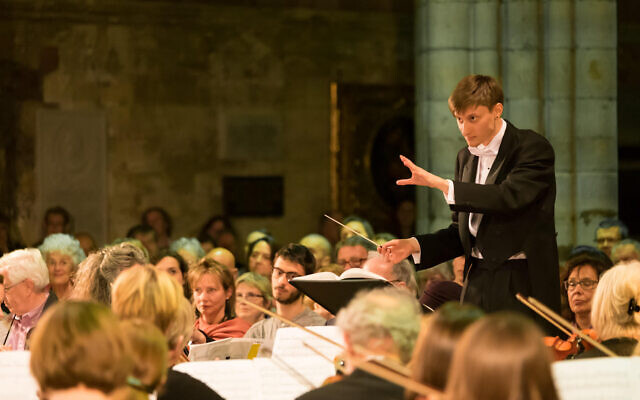Music from Auschwitz orchestras pieced together and heard for the first time
A chance conversation at the Nazi death camp in 2015 and a painstaking 'jigsaw' ever since led to this week's first airing in 80 years
Jenni Frazer is a freelance journalist
Conductor and composer Leo Geyer discovered a long-lost musical treasure at Auschwitz in 2015.
On Monday, after eight years of painstaking research, some of the abandoned musical fragments — restored by Geyer — were played for the first time in more than 80 years.
Geyer, 31, came across the music manuscripts when he visited the most notorious of the Nazi death camps.
It was a research visit, because he had been commissioned to compose a score in memory of Sir Martin Gilbert, the British Holocaust expert who had died that year.
During his visit, he said, an archivist told him that there were manuscripts which he was free to examine — fragments of music once played by orchestras at Auschwitz.
He told reporters: “I nearly fell over when he told me because I couldn’t believe that such a thing was there and that no one had really paid that much attention to it over the last 80 years”.
Geyer, who is not Jewish, was aware that there had been orchestras at Auschwitz and was eager to look at the material.
He was presented with what he terms “a complete mess” — 210 separate pieces of music manuscripts, some torn or partially burnt at the same time as the musical instruments in Auschwitz were crushed.
This happened as the Nazis were finally leaving the camp in January 1945, and were destroying and burning as much as they could in their haste to flee the Allies.
The then confident Geyer was 23 and accepted the near impossible challenge of reassembling the musical score, likening it to “a hundred jigsaw puzzles with multiple pieces missing and all jumbled up together.”
Where the gaps were too great, Geyer composed sections himself; in the meantime he traced what survivors he could, and cross-referenced the scores with photographs of musicians at the camp to work out which instruments would have been played.
Geyer says: “There were, at one point, as many as six orchestras at Auschwitz, and they were all very much sanctioned, and in some cases commissioned by, the SS”.
In Britain the most famous survivor of any of the Auschwitz orchestras is Anita Lasker-Wallfisch, now 98. She played cello, and is absolutely certain that playing in Auschwitz was what saved her.
In an online interview she gave to the Holocaust Memorial Day Trust, she said: “That I survived nearly one year in Auschwitz is without any doubt due to the fact that I became a member of the camp orchestra. As long as the Germans wanted an orchestra, it would have been counter-productive to kill us.
“Our task consisted of playing every morning and every evening at the gate of the camp so that the outgoing and incoming work commandos would march neatly in step to the marches we played.
“We also had to be available at all times to play to individual SS staff who would come into our block and wanted to hear some music —after sending thousands of people to their death.”
Lasker-Wallfisch’s grandson, Simon Wallfisch, a baritone, will be performing at Monday’s concert, The Orchestras of Auschwitz.
Four of the restored pieces will be part of a concert to mark the 10th anniversary of Leo Geyer’s interdisciplinary company, Constella Music, and will take place at Sadler’s Wells Theatre in central London.

Thank you for helping to make Jewish News the leading source of news and opinion for the UK Jewish community. Today we're asking for your invaluable help to continue putting our community first in everything we do.
For as little as £5 a month you can help sustain the vital work we do in celebrating and standing up for Jewish life in Britain.
Jewish News holds our community together and keeps us connected. Like a synagogue, it’s where people turn to feel part of something bigger. It also proudly shows the rest of Britain the vibrancy and rich culture of modern Jewish life.
You can make a quick and easy one-off or monthly contribution of £5, £10, £20 or any other sum you’re comfortable with.
100% of your donation will help us continue celebrating our community, in all its dynamic diversity...
Engaging
Being a community platform means so much more than producing a newspaper and website. One of our proudest roles is media partnering with our invaluable charities to amplify the outstanding work they do to help us all.
Celebrating
There’s no shortage of oys in the world but Jewish News takes every opportunity to celebrate the joys too, through projects like Night of Heroes, 40 Under 40 and other compelling countdowns that make the community kvell with pride.
Pioneering
In the first collaboration between media outlets from different faiths, Jewish News worked with British Muslim TV and Church Times to produce a list of young activists leading the way on interfaith understanding.
Campaigning
Royal Mail issued a stamp honouring Holocaust hero Sir Nicholas Winton after a Jewish News campaign attracted more than 100,000 backers. Jewish Newsalso produces special editions of the paper highlighting pressing issues including mental health and Holocaust remembrance.
Easy access
In an age when news is readily accessible, Jewish News provides high-quality content free online and offline, removing any financial barriers to connecting people.
Voice of our community to wider society
The Jewish News team regularly appears on TV, radio and on the pages of the national press to comment on stories about the Jewish community. Easy access to the paper on the streets of London also means Jewish News provides an invaluable window into the community for the country at large.
We hope you agree all this is worth preserving.






















